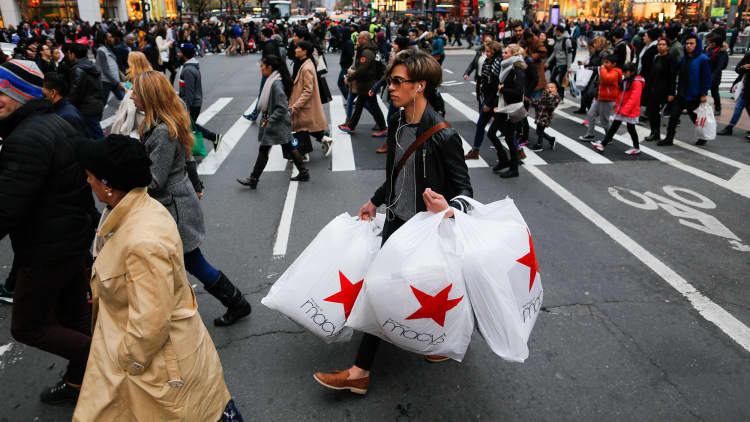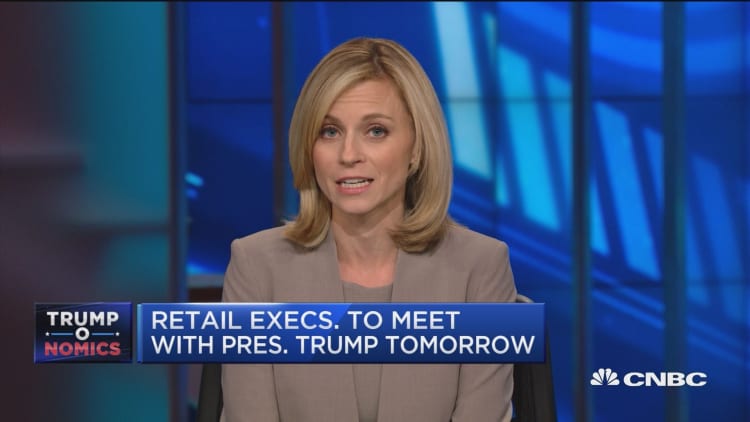
Retail industry executives met with President Donald Trump at the White House on Wednesday to push back against a proposal from congressional Republicans that would raise taxes on imports.
The companies' goal was to drive home the role that retail has played in fostering job growth during the nation's long economic recovery — and the potential damage that could be inflicted if their costs increase under any overhaul of the tax code.
They also planned to bring up the importance of infrastructure investment and regulatory reform. The chief executives who attended include the leadership of AutoZone, Tractor Supply, Jo-Ann Fabric and Craft Stores, Target, Best Buy, Gap and JCPenney.
"This is a plan that we think is risky and unproven," said David French, senior vice president of government relations at the National Retail Federation, the industry's main trade group. "We would urge them to reconsider this approach."
The executives were set to meet with lawmakers on Capitol Hill later Wednesday.
The plan crafted by House Speaker Paul Ryan, R-Wis., would allow companies to deduct the cost of goods that are exported. Importers, however, would not receive the same benefit — effectively imposing a tax on their products. The "border adjustment" proposal is estimated to raise about $1 trillion in tax revenue that would help pay for lowering the corporate tax rate to 20 percent, though most estimates indicate that it would not cover all the revenue lost from a lower corporate rate.
Retailers have been leading the charge from the business community against the proposal, organizing a group called Americans for Affordable Products. The executives are slated to meet later with Rep. Kevin Brady, R-Texas, who heads the powerful Ways and Means committee tasked with turning the tax plan into legislation.
"We have been racing to make sure that we're heard before they start writing this bill," French said.

The industry has long relied on low-cost imports, chiefly from Asia, to help keep prices low for bargain-shopping consumers. Implementing a border adjustment tax would ultimately force them to raise their prices, and the industry has called the proposal a "hidden sales tax." French pointed to the experience of Japan, which raised its sales tax three years ago and soon fell into recession.
French also warned of unintended consequences: Economists generally expect that a stronger dollar would mitigate the impact of higher costs under a border adjustment tax. But French emphasized the unique status of the dollar as the world's reserve currency and warned that a spike in value could have far-flunge ripple effects, like in Turkey, where much of the country's debt is held in dollars.
Meanwhile, other U.S. industries — many of them manufacturing companies — are lining up to support the plan, which they say could rejuvenate domestic production. The "American Made Coalition" includes heavyweights such as Boeing, Caterpillar, Pfizer and GE. They highlight a report by the conservative-leaning Tax Foundation that found the proposal would boost economic growth and create 1.7 million new jobs.
"Opponents of tax reform are defending an outdated and broken system that subsidizes cheap foreign imports at the expense of American manufacturers and workers," coalition spokesman John Gentzel said. "Ending the Made in America tax as part of a larger overhaul of the tax code will level the playing field for U.S. businesses and protect and grow jobs here at home."
It's still unclear where the White House stands in the debate. In an interview with The Wall Street Journal, Trump criticized the plan as "too complicated," but he later appeared to soften his stance.
The president has promised to unveil his own "phenomenal" tax plan within weeks that has the potential to reshape the debate in Washington.
Meanwhile, Republicans are facing a tough sell within their own party. Rep. Mark Meadows, who heads the conservative Freedom Caucus, told digital news outlet Axios on Tuesday that he is unlikely to support the proposal. Instead, he floated the potential of straightforward corporate and individual tax cuts without offsetting the cost of those cuts.
In the Senate, Mike Rounds of South Dakota and David Perdue of Georgia — the latter a former chief executive of Dollar General, which specializes in cheap consumer goods — have come out against the border adjustment in interviews on CNBC. Republicans cannot lose any more senators without jeopardizing their chances of passing the legislation with a simple majority vote through a process known as reconciliation.
At least three GOP senators have voiced concerns about how the proposal would actually work: Utah Sen. Orrin Hatch, chairman of the finance committee, Texas Sen. John Cornyn and Kentucky Sen. Rand Paul. Yet there is little consensus among lawmakers around what should replace border adjustment.
"There's no other alternative yet in the Senate," said Jon Traub, managing principal for tax policy at Deloitte Tax LLP. "The job for Hatch is to come up with something that his members can coalesce around."

